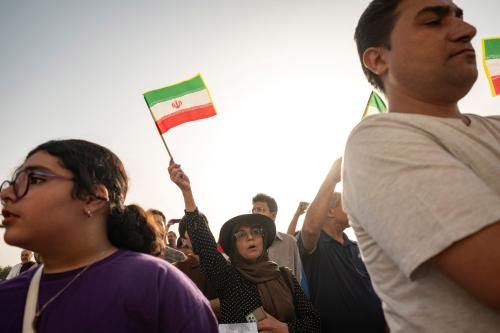We continue here Brookings’s interview series with Islamist leaders and activists, part of our Rethinking Political Islam initiative. We asked each participant to discuss the state of his or her movement and reflect on lessons learned from various crises, including the rise of ISIS and the 2013 military coup in Egypt. So far we’ve released interviews with a number of Islamists from across the Muslim world. The rest of our interviews and essays in the “Islamists on Islamism Today” series can found here.
Up next is Habib Ellouze, a member of Ennahda’s Shura Council. (Check out our earlier interview with Sayida Ounissi, an Ennahda MP here). A founding member of Tunisia’s Islamic Tendency Movement in 1981, he briefly led Ennahda in 1991, until his arrest and a 15 year prison sentence. In prison, he spent his time studying and writing research papers on tafsir, or Qur’anic interpretation After the 2011 revolution, he served as a member of Tunisia’s Constituent Assembly and gained new prominence as the most outspoken figure in Ennahda’s “conservative” wing. (Ellouze’s ideas and political evolution are discussed in Shadi Hamid’s “Islamic Exceptionalism.”)
In our conversation, Ellouze discussed a number of issues, ranging from lessons learned in government to the attraction ISIS has on youth in the region. In the country’s first democratic elections in 2011, Ennahda was voted into a coalition government alongside two secular parties. Ellouze argued that the biggest mistake Ennahda made was having an overly conciliatory attitude towards counter-revolutionary forces, and that, in hindsight, governing with a “firmer hand” would have been preferable. On hot-button issues—such as calling for the application (tatbiq) of sharia—Ellouze commented that Ennahda’s readiness to compromise on core Islamic priorities lost the party support with its religiously conservative base. Ennahda, in his view, was elected by their traditionally repressed constituency precisely to bring issues of Islam and Islamic identity to the fore. Ellouze also discussed Sayyid Qutb’s role and relevance as an Islamist theorist. He argued that, while undoubtedly charismatic and creative, Qutb did not provide any real strategy by which to govern modern states and their various bureaucratic organs. Lastly, he addressed the phenomenon of high numbers of Tunisian youth going abroad as foreign fighters for ISIS.
The Brookings Institution is committed to quality, independence, and impact.
We are supported by a diverse array of funders. In line with our values and policies, each Brookings publication represents the sole views of its author(s).








Commentary
Islamists on Islamism today: An interview with Habib Ellouze of Tunisia’s Ennahda Party
May 25, 2017